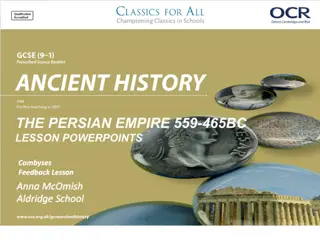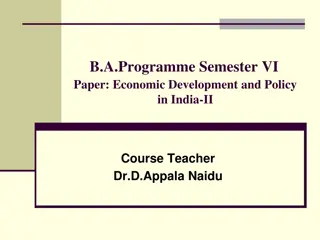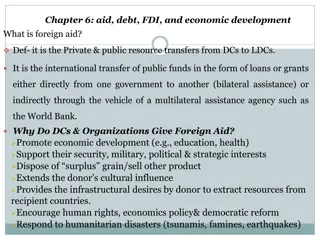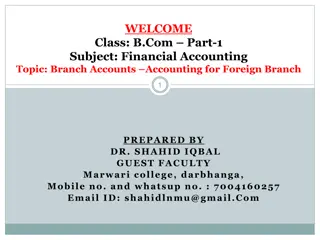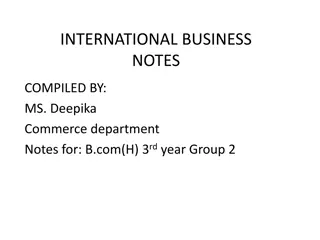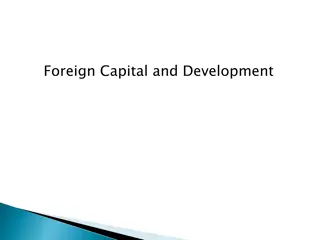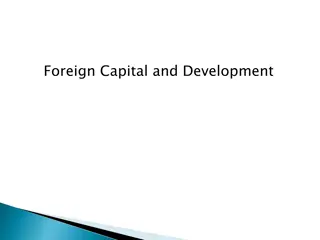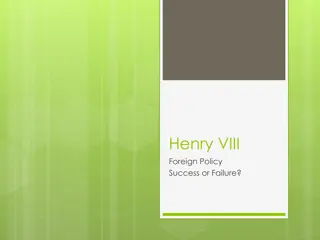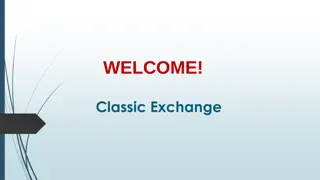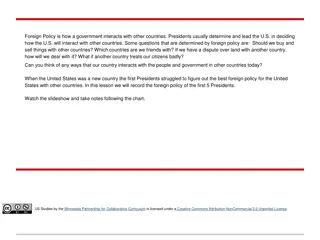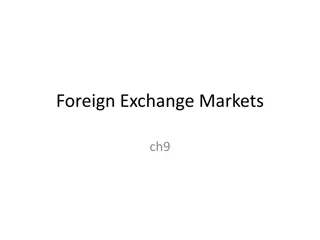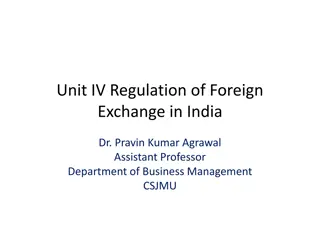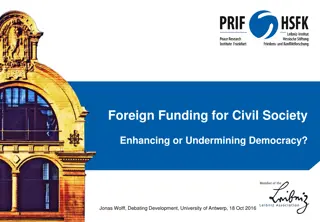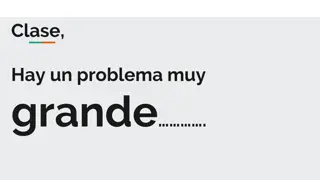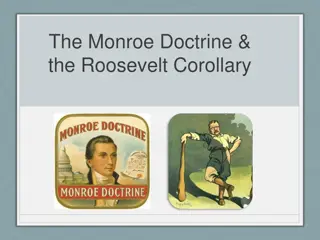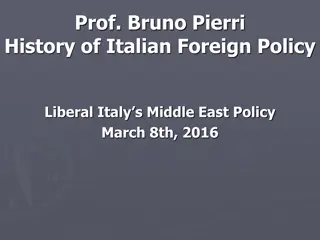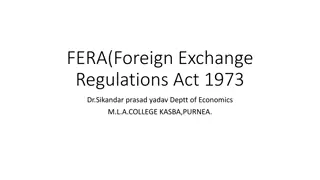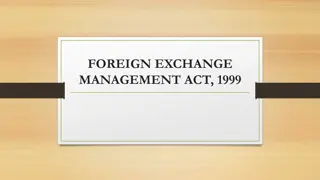Foreign Policy Analysis: An Introduction and Overview
Explore the field of Foreign Policy Analysis (FPA) through an introduction to key concepts and questions. Delve into understanding why nations make certain foreign policy decisions, examining factors like alliances, historical context, and interdisciplinarity within FPA studies.
Download Presentation

Please find below an Image/Link to download the presentation.
The content on the website is provided AS IS for your information and personal use only. It may not be sold, licensed, or shared on other websites without obtaining consent from the author. Download presentation by click this link. If you encounter any issues during the download, it is possible that the publisher has removed the file from their server.
E N D
Presentation Transcript
IR AND FOREIGN POLICY ANALYSIS: AN INTRODUCTION Brno Masaryk University 10-11 December, 2020 Dr. Hettyey Andr s
INTRODUCTION Structure 1- Introduction 2 -Assessing FP 3 - Decision-makers 4 - Bureaucracy 5 - Institutions 6 Social actors 7 - Culture
1/1 WHAT IS FOREIGN POLICY ANALYSIS? starting point is always the same: identify a foreign policy, which is often puzzling or counter-intuitive, and then try to explain it Why do great powers actively try to forge alliances with small countries despite their limited military resources? (Usa/Bahamas) Why did Jordan drop its territorial claims on Palestine? Why does France concentrate more of its official development assistance in its former colonies than does the United Kingdom? Why did Norway join the NorthAtlantic Treaty Organization (NATO) but refuse to join the European Union (EU), whereas Sweden chose to do the opposite? Why did Czechia and Hungary react so differently to the 2022 War? (arms transfer)
1/2 WHAT IS FOREIGN POLICY? a set of actions or rules governing the actions of an independent political authority deployed in the international environment when is a policy foreign? FP vs. domestic public policy => some overlap but FP deals with problems arising outside state borders geographic criterion: every action (or inaction) undertaken by a sovereign political authority in a context beyond the state s borders can be considered as a component of foreign policy, regardless of whether it is the responsibility of the ministry of foreign affairs or any other public authority. the political authority that adopts and implements a foreign policy has very limited control over its outcome because the outcome depends on variables that elude its sovereignty
1/3 INTERDISCIPLINARITY sociology, economics, public administration, psychology, statistics and history A single issue of a FPA journal may include articles on - the psychological profile of a head of state, - a study on national identity based on iconography, - a cybernetic model of the rationale of a ministry of foreign affairs and - a statistical analysis of the relationships between inflation rates and declarations of war over the last two centuries.
1/6 LEVELS OF ANALYSIS the individual level (first image), the national level (second image) and the international system (third image). => IR FPA mainly relies on Waltz first and second images as it is an agent-centered field of research. It focuses on actor-specific decisions and places the decision-making process at the center of its attention. FPA, therefore, concentrates on subnational factors, such as the personality of government leaders, social groups or the bureaucracy etc.
1/7 HISTORY OF FPA 1960s and 70s (databases): attempts to identify the main behavioral patterns in foreign policy had proved unsuccessful. Experts failed to develop large-range theories of FPA. This is because states behavior is conditioned by peculiar characteristics, such as cultural and political values, economic development and leaders perceptions. This makes impossible the production of theories with universal and timeless significance. => middle-range theories End of ColdWar: it became obvious that the structure of the system helps to explain continuity in international relations, but that the agents are more suitable for the study of its change.
2/1 ASSESSING FP Comparisons essential: In order to interpret a foreign policy correctly, researchers must carefully compare it with previous policies, other states policies or domestic policies. 5 benchmarks: goals, mobilized resources, instruments, process and outcomes.
2/2 GOALS/INTERESTS there is no necessary reason why the interests of self-seeking politicians should coincide with the national interest /David Lake/ In fact, it is often the political/economic etc.objectives that define the concept of national interest and not the other way around. /Morin-Paquin 23./ preservation of territorial integrity the stability of the international system, the accumulation of wealth, the increase in relative power, the maintenance of leaders in power or the reproduction of national identity. Timeless, universal? => GDR, Senegambia, United Arab Republic
2/4 WOLFERS!!! Status quo/revisionist states Millieu/possession goals Direct/indirect goals => Political leaders often hide behind the notion of national interest...This behavior allows them to depoliticize foreign policy and generate some legitimacy. Turkey-Hungarian relations
2/5 RESOURCES Most important resource: power Hard to measure? Power paradox: States do not always succeed in converting their resources into influence or even want to convert into influence: USA afterWWI Power: Hard power: whenA gets B to do something B otherwise would not have done (R. Dahl) Soft power (Nye): the ability to attract and co-opt Agenda setting-power: ability to prevent proposals from even being considered in the first place- influence can derive from the ability to suppress issues or to keep them off the agenda Productive power: the power to define the discourse what is a problem normal or not => A can manipulate the preferences of B so as to prevent conflict from occurring get B to want whatA wants Institutional power: institutions shape the bargaining advantage of actors, freeze asymmetries, and establish parameters for change that benefit some at the expense of others
2/6 INSTRUMENTS Socialization: the transfer of beliefs, values and ideas from one actor to another good databases
2/8 OUTCOME Effective? Costs-benefits? Popular? Costly/cheap?
3/1 DECISION-MAKERS For a long time, forces shaping history were great man ColdWar: impersonal prism of bipolarity Since 1990, the individual level of analysis has gradually regained its proper place 3 factors determine the role a person can play: - their institutional and political capacity to influence foreign policy. The centralization of authority varies from country to country. - willingness to exert major influence on FP the political opportunity available to decision-makers with regard to influencing foreign policy: e. g. crisis
3/4 COGNITION Cognition: refers to the mental processes that allow individuals to interpret their environment => Operational code: 10 questions more than 100 politicians (1) What is the essential nature of political life? Is the political universe essentially one of harmony or conflict? What is the fundamental character of one s political opponents? (2) What are the prospects for the eventual realization of one s fundamental political values and ideological goals? Can one be optimistic or pessimistic? (4) How much control or mastery can one have over historical developments? (5) What is the role of chance in human affairs and in historical development? (7) How are the goals of action pursued most effectively?
3/5 (MIS-)PERCEPTION Research shows that people rarely conform to the expectations of the rational choice-model Cognitive psychology has shown that people s prior beliefs strongly affect information processing individuals seek to maintain consistency of their belief systems this leads them to depart from rational inference and choice One of the most common forms of perception bias that has drastic consequences is to overestimate the hostility of one s rivals -Actions that are strictly defensive are frequently perceived as being offensive actions. At the same time, individuals tend to underestimate how much others mistrust them => security dilemma outbreak of WWI
3/6 PSYCHOLOGICAL EXPLANATIONS Common biases (shortcuts): - Fundamental attribuiton error: he did sth harmful because he wanted to I did sth harmful because circumstances forced me (dispositional situational factors) . and the reverse - Prospect theory: framing important: people dislike losing more than they like winning the same amount => leaders risk-averse when things are going well and vice versa loss aversion explains why most states are more prepared to fight in order to defend their territory than to conquer new territories, why they accept higher costs to maintain an international regime than to create one
3/7 EMOTIONS To believe that men will sacrifice their passions to their interests is to deny the experience of our century. /Raymond Aron/ Cognitive approaches still set rationality as the default against which behavior is measured Western culture traditionally sets emotions against reason as if they were independent thought processes, but the two are intervowen Emotion is first - emotion/affection and cognition co-produce political beliefs Emotional regime emotional community
3/8 EMOTIONS Herrmann 2017.: The more people attach their identity to a nation, the more likely they are to feel stronger emotions toward other countries when those countries are seen as either contributing positively to the observer s country s goals or frustrating them. the more intense the emotions get the more difficult it is for the observer to recognize that other people could legitimately see it another way Emotional map of Hungarian decision-makers since 2014: West: anger-shame loop because of rule-of-law criticism Ukraine: anger Russia: respect, affection Why do emtions play a big(ger) role in Hungarian FP?
4/1 BUREAUCRACY In modern democracies, the civil service is officially subordinate to the elected representatives. The bureaucracy is supposed to remain politically neutral and ensure that government decisions are implemented. While Eisenhower was preparing to move into the White House, the outgoing President Truman whispered to his advisors: He ll sit here, and he ll say, Do this! Do that! And nothing will happen. Poor Ike it won t be a bit like the Army. He ll find it very frustrating. Focus on decision-making process: multiple players: president/PM/FM/other ministers (MoD, Treasury)/state secretaries/ambassadors/diplomatic corps/military officials/secret services/press/think tanks/public opinion/
4/2 BACKGROUND CUBA https://www.youtube.com/watch?v=XbKCyQn5oTc Allison!!! 1. Rational Actor Paradigm: unit of analysis: gov action as choice gov as unitary decisionmaker with one set of goals, one set of options and a single estimate of the consequences that follow from each alternative Every relevant information at his fingertips at every moment Decision-maker: God
4/3 ORGANIZATIONAL PROCESS Focus on bureaucracies - Unit of analysis: decision as organizational output 1. How does a bureucracy work? when a problem arises, tasks are divided - each org attends to a special set of problems and acts in quasi-independence on those problems but few important problems fall exclusively within the domain of a single org the behavior of large numbers of individuals must be coordinated this requires Standard Operating Procedures Like a football team: performing maneuvers specified by a previously established play the preemeninent feature of org activity is its programmed character: the extent to which behavior in any particular case is an enactment of preestablished routines Time factor: not all info is on the desk of the decision-makers they do not pass instantaneously from bottom to top of the org they can be in the system without being available
4/4 ORGANIZATIONAL PROCESS 2. What and how does a bureaucracy see? govs perceive problems through organisational sensors govs define alternatives and estimate consequences as their component organizations process information govs act as these organizations enact routines/SOPs ergo: gov behavior less as deliberate choice and more as outputs of large organizations functioning according to standard patterns of behavior
4/5 ORGANIZATIONAL PROCESS 3. Interests of bureaucracies the behavior of each US military service seems to be characterized: to avoid a decrease in budget a decrease in manpower decrease in key specialists encroachment of other services on that service s role and mission inferiority to an enemy weapon
4/6 ORGANIZATIONAL PROCESS 4. Why is all this important? presidents rarely, if ever, make decisions in the sense of writing their conclusions on a clean slate the basic decisions which confine their choices have all too often been previously made 3 options-example analysis of formal gov choice centers on the info provided and the options defined by organizations detail and nuance of actions by orgs are determined chiefly by org routines not gov leaders decision - org s interest in controlling rather than presenting choices actor not a monolith but a constellation of loosely allied organizations => Cuba: standard gear for a battleready regiment includes tanks, anti-tank weapons and artillery/ no camouflage
4/7 GOVERNMENTAL POLITICS basic unit of analysis: gov action as political resultant Focus on concrete politicians 1. How do politicians work? each leader inside the gov is a player in his own right no unitary actor but many actors who not focus on a single strategic issue but on many diverse intra-national problems as well players who act in terms of no consistent set of strategic objectives but rather according to various conceptions national,. organizational and personal goals gov leaders have competitive, not homogenous interests priorities and perceptions are shaped by positions making sure that the gov does what is decided is more difficult than selecting the solution
4/8 GOVERNMENTAL POLITICS 2. Simultaneous roles roles of MFA: senior adviser to PM collegaue of the other ministers and senior advisers ranking US diplomat in negiotiations representative of the President s foreign policy in Congress educator of the public administration voice to the outside world Mr. State Department, leader of officials, spokesman for their causes, guardian of their interests his bag includes sensitivity to certain issues, commitments to various projects, personal standing with and debts to groups in the society the interests that affect players desired outcomes include national security interests, org interests, domestic interests, personal interests removal of American troops from Europe: for the army a threat to its budget and size to the Budget Bureau a way to save money to State a threat to good relations with NATO to the President s advisers a good way to remove a major irritant in the President s relations with the Hill
4/9 GOVERNMENTAL POLITICS 3. Why is this important? Decision is a resultant in the sense that what happens is not chosen as a solution to a problem but rather results from compromise, conflict and confusion of officials with diverse interests and unequal influence policy emerges from overlapping, intricate games played simultaneously Gov not unitary agent or a conflomerate of orgs but a number of individual players solutions to strategic problems are not discovered by detached analysts focusing coolly on the problem where you stand depends on where you sit: the diverse demands on each player shape his priorities and perceptions Cuba: Bay of PigsAchilles-heel/could any member of the gov solve HIS problem by an attack?
KISSINGER Ministers rely on their bureaucracy, because of the huge work-load Diplomats think they know more than their minister Room for sabotage Bureaucracy always pro-status quo Huge machinery slow tempo Short-term instead of big picture Dipomat of whom?
KISSINGER Biggest challenge: : impose a sense of direction Diplomats emphasize negotiability consciousness of what the other side will accept there is less sensitivity to the pressures and incentives that can alter perceptions that define negotiability foreign service generates caution rather than risk-taking, near term rather than long-term Great foreign policies have been originated by leaders who were opposed by experts it is the responsibility of the expert to operate the familiar and that of the leader to transcend it
5/1 INSTITUTIONS Foreign policy decisions are always made within an institutional framework, which shapes actors preferences and behavior. This is one of FPA s most firmly established observations. As Thucydides observed 2500 years ago,democracies, aristocracies and monarchies are driven by distinct mechanisms that lead to different foreign policies.
5/2 INSTITUTIONS 1. Presidential systems: the management of foreign policy is entrusted to the president, but the president cannot ignore the counter-power exercised by parliament.=> Senate/Congress 1920 League of Nations regulating external trade setting the budget confirming ambassadors (no automatic support form parliament) 2. Parliamentary systems: the prime minister at the head of a parliamentary regime is drawn from parliament and generally controls the majority. Therefore, he has greater autonomy when it comes to managing foreign policy. (almost always support from the parliament)
5/3 INSTITUTIONS Right-wing or left-wing parties: right-wing governments, whose voters are generally less pacifist, are more likely to be involved in armed conflict. Left-wing governments, on the other hand, are more likely to be attacked by foreign countries. They also give more development aid. => Hungarian minorities abroad Coalition governments tend to adopt foreign policies that are momentarily more extreme in some way more volatility
5/4 DEMOCRATIC PEACE!!! comes as close as anything we have to an empirical law in international relations Reason for it? - Not in the financial, trade interest of democracies lose more than they might gain => wars are unpopular among the electorate Democracies do not fear each other because they see the peaceful resolution of conflicts inherent in their domestic structure
6/1 SOCIAL ACTORS Public opinion public opinion does not exist Until the 1970s, most analysts were extremely critical of public opinion. It was perceived as being incoherent, volatile and capricious Almond-Lippmann consensus: By studying biennial Gallup polls and how Americans rate the most important issues, he observed that public opinion seemed to be incapable of maintaining stable preferences and a constant focus
6/2 SOCIAL ACTORS Page-Shapiro (1998) (1992): American public opinion remains relatively constant. Between 1930 and 1990, there was a less than 10% fluctuation for 73% of the responses to questions that were asked at least twice. Not only that, when there was a sudden turnaround in public opinion, it was systematically in response to new information. Thus, Page and Shapiro concluded that public opinion is more rational than incoherent. This view is still held by most analysts Although analysts have now basically abandoned the Almond Lippmann consensus, one fact remains: preferences revealed by opinion polls are distinct from those expressed by the elite. In several Arab countries, public opinion supports more aggressive policies toward Israel than their leaders
6/3 SOCIAL ACTORS Structure In general, opinions on foreign policy are more easily broken down along lines that are specific to foreign policy. the first sets internationalism against isolationism the second sets conciliation against militant action third:unilateralism vs multilateralism does public opinion influence FP? Yes!
6/4 STRONG VS. WEAK STATES Bottom-Up --> Leaders follow masses; Top-Down --> The popular consensus is crucial to elites consensus. Public opinion can however be manipulated by political leaders due to reasons such as lack of awareness of issues, volatility of public opinion, foreign policies are less relevant in comparison to economic policies;
6/4 I will argue that the policy impact of public opinion does not depend so much on the specific issues involved or on the particular pattern of public attitudes as on the domestic structure and the coalition-building processes in the respective country. What is domestic structure? institutions (the "state"), basic features of the society, and the institutional and organizational arrangements linking state and society and channeling societal demands into the political system. In other words, domestic structures determine how political systems respond to societal demands. Social movement research talks about "political opportunity structures."
6/4 STRONG VS WEAK STATES 1. political system: The first focuses on state institutions and has found its most prominent expression in the concept of "strong" and "weak" states. It emphasizes the degree of centralization of state institutions and the ability of political systems to control society and to overcome domestic resistances. Weak states have fragmented political institutions and are open to pressures by societal interest groups and political parties. This varies as a function of a series of institutional factors. In general, autocracies are more centralized than democracies, unified countries more so than federations, parliamentary regimes more than presidential regimes, majority governments more than coalition governments, unicameral parliaments more than bicameral parliaments and two-party systems more than multiparty systems And the number of veto players HUN: strong state, centralization, small number of veto players
6/5 STRONG VS WEAK STATES 2. society: The structure of society regarding its polarization, the strength of social organization, and the degree to which societal pressure can be mobilized: How heterogeneous is the society in terms of ideological and/or class cleav- ages? How well developed are social coalitions and organizations in their ability to express grievances and raise demands? A 3. policy networks: nature of the coalition-building processes within society and state: This concept emphasizes the ability of political actors to build consensus among the relevant elite groups in support of their policies.' HUN: state-dominated
FRA s HUN: In countries with centralized political institutions but polarized societies and rather weak social organizations, the policy network is likely to be state-dominated. The policy- relevant coalition build ing would then be restricted to the political elites and would more or less exclude societal actors and/or public opinion. In contrast to the U.S. case, French public opinion is likely to play only a marginal role in the foreign policy-making process. The Fifth Republic's centralized political system and a fragmented societal structure make it difficult to build a public consensus on policy issues and would be expected to limit the public impact on foreign and security policy. mass public opinion mattered in each of the four countries, albeit to very different degrees. Policymakers in liberal democracies do not decide against an overwhelming public consensus. In most cases, mass public opinion set broad and unspecified limits to the foreign policy choices




